Items
Tag is exactly
law enforcement
-
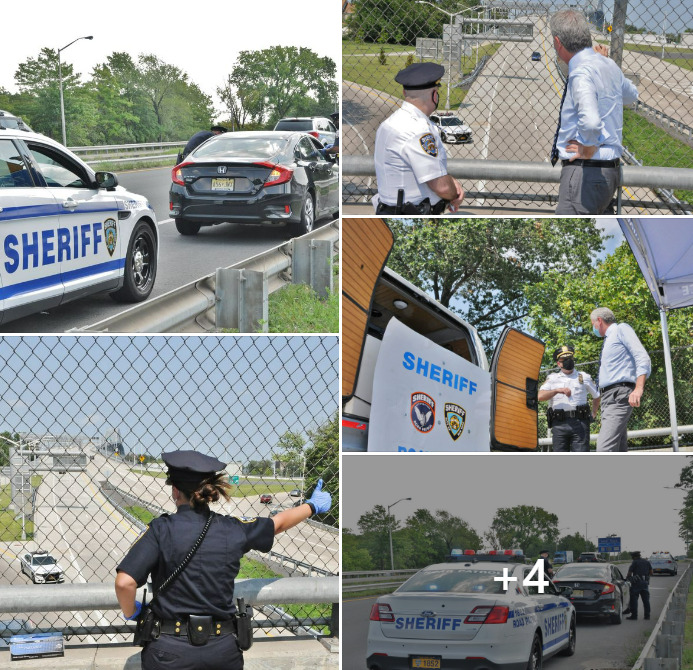 August 30th, 2020
August 30th, 2020Mayor DeBlasio visits Staten Island
Former Mayor Bill DeBlasio visiting Staten Island Branch of the New York City Police Department -
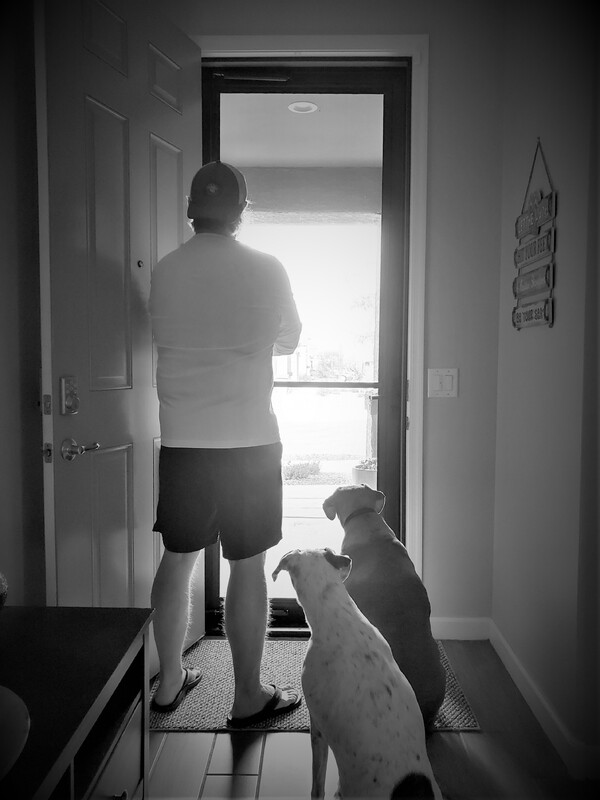 2021-04-21
2021-04-21James Rayroux's JOTPY Portfolio
--Reflections on the Pandemic Archive-- Looking back over my experience with the “Journal of the Plague Year” COVID-19 archive, my prevailing emotion is gratitude. This opportunity granted me experience that few historians earn, and the remote, asynchronous work schedule allowed me to collaborate with my colleagues in ways that maximized our respective contributions. The breadth and depth of our individual experiences and perspectives tremendously improved our collective process and products. I spent enough time in the Arizona State Archives last year to recognize such collections as historical treasure chests, but I have now participated in processing an archive’s content and navigating the ethical dilemmas those submissions sometimes create. Archivists and curators are the history profession’s truly unsung heroes, and their work facilitates society’s perception of itself. My background in police work and public safety drew me to the archive’s existing Law Enforcement collection. In taking on that subset, I succeeded in reshaping the collection’s parameters to now include stories about police and law enforcement. I wanted to diversify the collection to encompass perspective of both the police and the public with whom they interact and serve. While some overlap exists between the Law Enforcement and Social Justice collections, each remains distinct. Through my contacts and writing, I promoted a Call for Submissions to an international audience of law enforcement professionals to reduce their relative silence within the archive. Within the archive’s content, I recognized that one’s location might shape their pandemic experience, and I created and designed an Arizona-based exhibit to explore that. Further research and discussion with my mentors and colleagues ensured the exhibit illustrated these differences without excluding visitors whose diverse experiences could further enrich the archived and exhibited content. I am proud of my “Arizona’s COVID-19 Pandemics” exhibit, particularly because of its compressed, one-month incubation period. Beyond displaying images, data, and stories representative of the diverse pandemic experiences within the state, the ACP exhibit offers visitors numerous levels of interaction and engagement to became active participants and create their own exhibit experience. Visitors can complete opinion surveys, add a story to the archive, explore additional content related to the displayed pieces, view ever-changing results from pre-defined archival content searches, conduct their own archival search, view collective visitor survey results, and apply to join the staff. The exhibit’s searches will include the archive’s future submissions, which reshapes both the exhibit and the experience visitors may have with it. A more detailed explanation of my ACP exhibit may be reviewed here: https://covid-19archive.org/s/archive/item/43037 Because of Dr. Kathleen Kole de Peralta and Dr. Mark Tebeau, I stand prepared to join research, curation, and exhibition teams and immediately contribute to their work products. Despite my gratitude for this experience and the opportunities it presented, I look forward to the day COVID-19 is no longer part of humanity’s daily vernacular. James Rayroux 22 April 2021 -
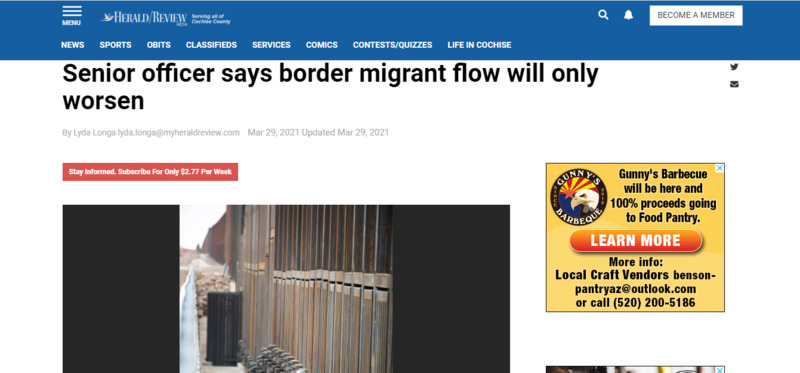 2021-03-29
2021-03-29Senior Border Patrol officer says border migrant flow will only worsen
"Senior officer says border migrant flow will only worsen" By Lyda Longa, lyda.longa@myheraldreview.com, Mar 29, 2021 The situation with undocumented migrants flocking to the Southwest border of the United States from Mexico is only going to worsen, a senior Border Patrol agent warned Friday. The agent, who spoke to various media outlets during a conference call, said at least 380,000 undocumented people had been apprehended at the Southwest border in February and the numbers would be higher for March and beyond. The agent spoke on background with the agreement that media would not reveal his name. “I fully expect to see the numbers increase as we go into the summer months,” the senior agent said, concerning migrant crossings. In Cochise County that warning has begun to bear out near Douglas and in Willcox, where the already stretched-thin Border Patrol is arresting more single adults attempting to slip into the country or taking in and processing children who are flocking to the border unaccompanied. Douglas Mayor Donald Huish said Friday the latest information he received this week from Border Patrol agents at the station just outside Douglas is that they’re confronting and repatriating about 100 single adults daily who are trying to slip in illegally. “They are getting closer and closer to town,” Huish said. What concerns Huish even more is that Border Patrol agents from the Douglas station are being pulled out to help in busier areas such as Yuma and Tucson. “They’re siphoning them off to the western part of the state and leaving us with a skeleton crew,” Huish said. In Willcox, Mayor Mike Laws said he was told two weeks ago by the Border Patrol there were 54 unaccompanied children at the Border Patrol station. “That was two weeks go. Who knows now?” Laws said. “The station can only hold up to 81.” Laws said he was told by Border Patrol that a “third party” has been arriving at the facility and taking 10 to 20 children to Phoenix by via bus. The mayor said he does not know how often the transportation comes or who the third party is. “We have not seen anyone (undocumented migrants) running the streets so far,” Laws said. “All we have is the youths, but we don’t see them either.” Laws and Sierra Vista Mayor Rick Mueller said citizens in their respective communities would gladly help the undocumented migrants but there aren’t enough resources available to do so. Laws, Mueller and other mayors in Cochise County signed a letter recently asking the federal government for help with the matter. Last week, the town of Gila Bend, which has a population of about 2,000, declared an emergency after Border Patrol agents dropped off a group of migrant families with children in a park. Gila Bend Mayor Chris Riggs told reporters he and his wife ended up using loaned vans to drive the families to the Phoenix Welcome Center so they would have a safe place to stay. Riggs said Border Patrol agents told him to expect more of the same. Mueller said there have been no such issues in Sierra Vista, but he is worried that the municipality, if hit with something similar to what happened in Gila Bend, would have no resources to offer. Last week Arizona senators Kyrsten Synema and Mark Kelly announced they’ve been pushing for more federal resources to help Arizona cities with a sudden influx of undocumented migrants. The senators helped secure at least $110 million from the Federal Emergency Management Agency as reimbursement to cities that assist migrants left within their jurisdictions. Also last week, Arizona Gov. Doug Ducey and Florida Senator Rick Scott — who sits on the Homeland Security Committee — called on President Joe Biden and Department of Homeland Security Secretary Alejandro Mayorkas to visit the Southwest border. Ducey and Scott, accompanied by a handful of law enforcement and other elected officials, had toured a portion of the border near Douglas. At his first press conference on Thursday since taking office in January, Biden said he would come to the border soon, but thought a visit now would deflect attention from the issue at hand. The senior Border Patrol agent who spoke Friday, meanwhile, said 300 Border Patrol agents who work along the northern border of the U.S. have been “mandated” to the Southwest border to assist with the influx of migrants. He said about 2,000 family units out of the 6,000 who are trying to cross daily are being processed in Texas by the Border Patrol. The agent revealed that unaccompanied children are being kept in Border Patrol facilities longer than the 72 hours established by law because too many are showing up and agents are overwhelmed. “They’re keeping them a few days, sometimes up to a week,” the senior agent said. Once an unaccompanied child is encountered, Border Patrol contacts the Department of Health and Human Services. The latter makes arrangements for the migrant children to be taken by the Office of Refugee Resettlement. The agent also mentioned an increase in the criminal element among undocumented migrants. “The threats we see are significant,” the senior agent said. “We have seen criminal (undocumented migrants).” Additionally, he said that COVID testing for migrants is only being done in facilities in Del Rio, Texas, and soon in the Rio Grande Valley in Texas. Other than that, testing is being undertaken by non-governmental agencies that are helping the migrants and U.S. Immigrations and Customs Enforcement officials. He said it was probable that some migrants with COVID-19 may have been released into communities. -
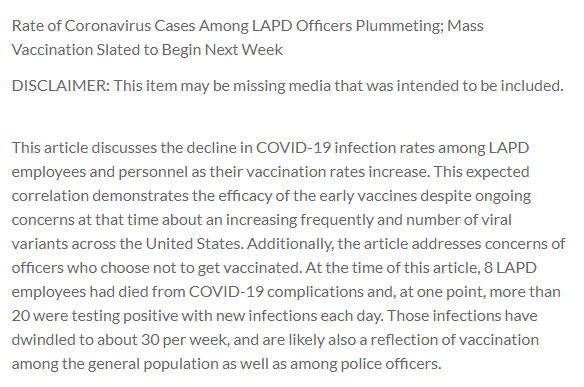 2021-02-24
2021-02-24Rate of Coronavirus Cases Among LAPD Officers Plummeting; Mass Vaccination Slated to Begin Next Week
This article discusses the decline in COVID-19 infection rates among LAPD employees and personnel as their vaccination rates increase. This expected correlation demonstrates the efficacy of the early vaccines despite ongoing concerns at that time about an increasing frequently and number of viral variants across the United States. Additionally, the article addresses concerns of officers who choose not to get vaccinated. At the time of this article, 8 LAPD employees had died from COVID-19 complications and, at one point, more than 20 were testing positive with new infections each day. Those infections have dwindled to about 30 per week, and are likely also a reflection of vaccination among the general population as well as among police officers. -
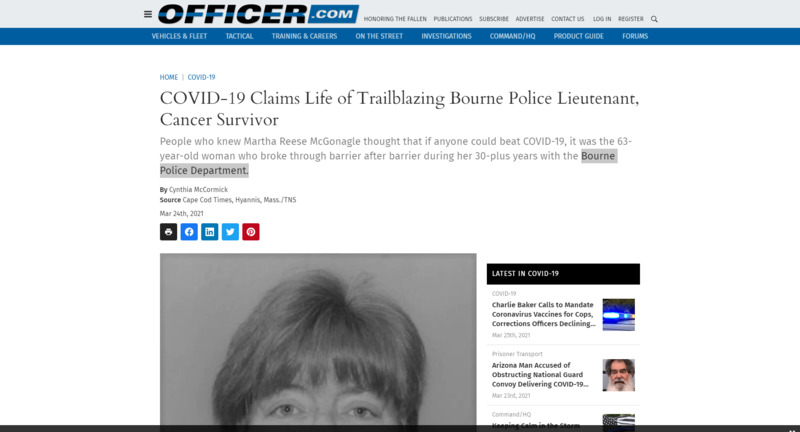 2021-03-24
2021-03-24COVID-19 Claims Life of Trailblazing Bourne Police Lieutenant, Cancer Survivor
The COVID-19 pandemic continues to affect law enforcement personnel far more than all other job hazards. The SARS-CoV-2 virus killed more American police officers and law enforcement personnel in 2020 than any other cause of death, and that trend appears to continue in 2021. Unlike most other essential workers, law enforcement professionals cannot reliably keep social distance or avoid personal contact with the public and their colleagues. Additionally, they are unable to seek reasonable accommodations that would allow them to do so, and their failure to fulfill their duties and sworn obligations is often grounds for dismissal and decertification. -
 2021-03-20
2021-03-20Oral History: Interview with Anonymous Peace Officer #1
James Rayroux 0:00 My name is James Rayroux. I'm a graduate student in global history at Arizona State University, and I'm working as a curation intern with the "Journal of the Plague Year" COVID-19 archive. Today is March 21, 2021, and it's just after 5pm or 1700 hours here in Arizona. I'm speaking with a narrator who wishes to contribute to the COVID-19 archive anonymously. Sir, I first want to thank you for speaking with me and contributing to this COVID-19 archive. Do you consent to having this interview recorded, transcribed, and immediately posted to the "Journal of the Plague Year" COVID-19 archive, where it will be made accessible to the public? Anonymous Officer 0:39 I do. JR 0:40 Thank you, I greatly appreciate you making time to share your experience with us. In lieu of your name and city, can you provide me with a summary of your background and professional experience in law enforcement? AO 0:57 Yeah, I've been a sworn police officer for a little over 10 years in northern Colorado. I've worked for a couple different departments during that time. I started off at a small municipality, and at one point worked for a state law enforcement agency and then working for a municipality that has approximately 150,000-160,000 citizens within the jurisdictional limits of our department. JR 1:25 Can you give me a summary of your life before law enforcement and what led you to police work? AO 1:33 Yeah, so I grew up with a family of cops, a grandfather and two uncles who were police officers, so I'd always kind of had that in the back of my mind. When I was a teenager, I started working out with an alcohol and tobacco compliance team. So I would go in and attempt to buy tobacco and alcohol products underage to ensure that corporations were properly ID'ing the people who came in to buy those products. I studied criminal justice a little bit in college, although that's not what my degree's in. I went to a police academy and then worked at the departments that I previously mentioned. And then within the realm of police work, my emphasis has mainly been of a traffic safety, impaired driving nature, so that's where my expertise kind of lies within the realm of police work. JR 2:38 What are some of your professional goals over the next few years, and where would you like to, what would you like to accomplish before the end of your career? AO 2:50 My sights in the next couple of years, I'm currently working on a master's degree in organizational leadership. With that degree, I would like to promote within my department to at least the rank of sergeant. And like I said earlier, I work for a larger department. Previously, I came from smaller departments, and I kind of missed that small town feel, so eventually, I'd like to parlay that supervisor experience in my larger department into being a supervisor at a smaller municipality or a smaller county agency where I think I could bring both sides of working for a small agency as well as looking at working for a large agency to help a smaller agency, because they don't usually get a lot of super qualified candidates for the higher positions. It's kind of what is already at the department, which sometimes is great, and sometimes it's not so great, and I think that having somebody that just hasn't came up through that agency to bring some new kind of fresh ideas is really good for us. That's ultimately the goal. JR 3:58 And when and how did you first learn about the SARS-CoV-2 virus in early 2020? AO 4:08 Initially, I heard about it on the news, broadcast news, and then I visited enough websites, mainly Reddit, which is often called "the front page of the internet" that kind of started talking about it and how it was kind of on the West Coast. Obviously, Northern Colorado is more westerly in the US, than, you know, the middle of the country, and Denver, our biggest city in Colorado, obviously has an international airport, and there's lots of things that come through, so I kind of kept an eye on it. Also with the nature of my work, I come into contact with people of all different kinds of races, religions, sexes, creeds, orientations, all of that both, willingly and unwillingly, so I kind of kept my eye out and knowing that there could be a good chance that if it came to Colorado that I would be involved with it just because, traffic stops, disturbances, sometimes we have to take people into custody against their will if they have a warrant, or they're fighting us, so that's a really close contact, like hands-on situation. So I knew if it did get worse, I didn't expect to be this bad, but if it did get worse, that it'd probably end up affecting us in one way or another. JR 5:22 Do you remember what some of the early conversations were like that you had about the SARS-CoV-2 virus or COVID-19, what those conversations at work were like or were about? AO 5:36 Yeah, a lot of them were just kind of like, you know, this is just a really bad flu. As long as you, you know, sanitize your hands after you deal with people, which is a pretty common thing that cops do. I know, the majority of cops that I work with carry around a little bottle of sanitizer, either on their person or in their what we call a "war bag," a little bag that sits in the front seat that holds all our tickets and everything else we need for the shift. So it was initially just, you know, be smart. If somebody's sick, keep your distance if you can, wash your hands, sanitize. And then once summer comes in, because early it was spring, where it's still pretty cold here, that once summer comes, the heat will naturally kill it off, and it's not going to be anything worse than the normal flu was initially the talk around town. JR 6:24 How did your agency first deal with the COVID-19 pandemic? AO 6:30 So initially, we got multiple emails, kind of just updating it from what they've heard from the Surgeon General in Colorado that was disseminated to people higher up in the city side of our agency, with just tips, kind of like what I just talked about, wash your hands, you know, don't touch your face or mouth, sanitize your hands, sanitize your cars. And it was just kind of a more official version of what we all kind of thought, which was that it was just a worse flu as long as you, you know, stay at home with your sick, don't voluntarily interact with sick people, etc, etc, that it would be good and we'd be done by summer. JR 7:13 At what point did your agency start encouraging or mandating mask use by employees? AO 7:23 So I want to say early March is when the governor of Colorado put us on a statewide lockdown. So I want to say maybe mid February to late February, is when we got a order to make sure that we're wearing masks, if we're around each other, if we're going to be in somebody's house. They were saying they prefer it on traffic stops, but they know because of the nature of us standing in traffic and it's kind of already hard to hear that, that was kind of our discretion. But I want to say mid to late February was the big one. It's also when we stopped doing in-person briefings. We have a specific briefing room where our sergeants, commanders will talk to us about what happened earlier in the shift, what they expect of us tonight, just conversations about our shift in general that's usually done in a room. It was about that time that we move that outside. So we all just kind of stood outside our police department and ended it to be a little bit safer than being in the booking room. But even when we did that we still wore masks were outside doing our briefing. JR 8:28 What do you remember or what did that first pandemic briefing or roll call look like when everyone showed up in, in masks? AO 8:37 It was definitely interesting. You know, it's just something that you usually don't see unless you're in a hospital setting, which we obviously go to sometimes if we have bad car accidents or bad assaults. But again, even that's usually if the person is thought to have been sick or something else, where you're obviously not standing in the emergency or the surgery department. So it was a little bit different seeing everybody with these, at the time, surgical masks. We ended up getting given cloth masks and everybody eventually started you know, finding a mask they liked better, but initially, it was just paper surgical mask like you see at the hospital, so it was definitely a strange sight to see twenty cops standing around with their mask on. JR 9:23 How have your agency's policies and procedures changed since that initial response in February 2020? AO 9:31 Um, so as COVID kept going up and more and more cases and especially in Colorado, and especially Northern Colorado where there was a higher outbreak than the rest of the state, we got, I don't know the name of the product but it's essentially a super medical grade cleaning product that is so strong that you have to wear gloves and a mask anyway when you're using it because it can burn your hands and you don't want to inhale it. So we are given directives to wipe down everything we touch on our car. So steering wheel, driver-side door handles, radio mics, computers, shifter, etc, with that cleaning product both before and after our shift. And then our department also bought a bunch of small hand sanitizer bottles for everybody to carry with them. And then we had two big jugs in our, what we call patrol room where we type our reports, that we could refill those smaller bottles with. And then we were given a mandate to wear masks anytime we were in contact with somebody. And if we could, any calls that we were, we can, we would normally take in person, such as like a cold theft or something just for customer service reasons, if we're not super busy, we'll usually go to that person's house and just get their statements so they can have a face-to-face contact. We were given a directive, though, to do all that over the phone as much as we can. So there would be nights that just wasn't a busy in-progress night, and I would take fifteen calls, all from my car parked in a parking lot somewhere. So after a decade of doing this, that was a big difference in what I was used to. JR 11:12 For the benefit of the audience, can you explain what a cold theft report is? AO 11:17 Yeah, so a cold theft report is if somebody came home from dinner, and let's say their son, their twelve-year-old son left their bicycle just outside in the front yard leaned up against the house, they get home and that bike was gone. And they don't have any kind of surveillance systems, you know, they weren't home when it happened, so they know that something was stolen, but they have no idea of exactly when, no real description of who might have taken it, and we call that a cold theft. It just means that it's not something that's in-progress. Like if somebody were to call and say, "Hey, you know, there's actively a fight going on right now at the mall." Um, that would be an in-progress call, or a hot call is what some people call it. Anything cold, so a cold theft, a cold burglary, a cold auto theft just means that it's something that's not actively happening, and they don't really have much information to go on. JR 12:05 Thank you. Do you remember what your first inperson call was after you began wearing masks, and maybe your first call after the public started wearing them as well? AO 12:19 I don't recall the specifics of either. I know that there was a couple calls I went to when you know, we were mandated to wear the masks. And you know, police officers still have freedom of speech just like everybody else does. But, you know, working for any organization, whether public, like the government or private, you still follow the rules and policies, procedures of your police department or your, your company. In this case, my police department or my company said that, you know, there's a new policy that we'll wear these masks. So it was weird, because there are some houses we go to where we would talk to people in-person and, you know, they'd be like, "Well, this is dumb. I don't know why you're wearing this mask. This is essentially the flu, why would you wear it?" You know, I'd have to be like, "Well, you know, my opinion on it is irrelevant. At this point, I'm here for a reason, but my boss told me to wear this, and my department told me to wear this, and that's why I'm doing it." And then we get the opposite where we go somewhere, and we would have the mask on and so would they and they're like, "You know what, I'm really glad that you guys are taking this seriously, and, you know, there's a lot of people that aren't." At that point, they're happy so I'm not going to say anything to change it. But you know, we would give people a mask that would ask us. "I'm glad you guys are doing this. Do you think this is as bad as it is?" And I would say, "You know, well, my again, my opinion on it's irrelevant. My boss told me to wear this mask, my department told me to wear this mask, so that's why I'm wearing it. Anyway, how can I help you with the reason that you called today?" JR 13:53 Has the pandemic changed your sense of security around fellow cops or fire crews or EMS personal? AO 14:02 I don't know if it's so much has changed my sense of security. I know it's changed things that we've, we've done things a lot different. It's not uncommon for police officers and my agency or anywhere across the United States to also be dispatched to fire medical calls. And we provide what's called scene security. So firefighters, a lot of them also double as paramedics and EMTs. And obviously EMTs and paramedics are those things. They have a job to do, and that's you know, rescuing people or providing life saving medical intervention on people. And sometimes especially if it's drug or alcohol fueled, there can be other people on scene that are concerned or upset and they want to get involved with it. And so law enforcement will get dispatched to assist with that and make sure that the scene is safe or secure, so that the firefighters and EMTs can do what they need to do. And usually we'd always go to those. It changed a lot where if somebody was COVID-19 positive or had symptoms of it, and it didn't seem like we needed to be there, we would go to a lot less of those just to keep our officers safe and not put them in unnecessary danger. JR 15:11 Has the COVID-19 pandemic affected your process or procedures for detaining, arresting, or booking suspects or arrestees? AO 15:23 Not so much for detaining or arresting, those thresholds are met at certain times, and for various reasons. You know, so I've detain people before that, I don't think are alleged to have committed crime at that point. But because of their general behavior, or things they've said or things they've done it, they're detained from an officer safety perspective, so they can't hurt us, and they don't hurt anybody else. Obviously, I've detained people because I feel like they may flee from us, and, you know, I have a reasonable suspicion that they've committed a crime, and so they're going to get detained until we can figure everything out. So our department is really great about stressing as far as keeping yourself and your partner safe, nothing changes. So whatever you need to do to make that happen is fine. I work for a municipality, so our "booking standards" is what we call them, so what we can and cannot book people for is set by the sheriff of our county, who runs the the jail. Because of the COVID things, and obviously, you get inmates that are together in tight spaces, and there's a lot of them, he relaxed them, and essentially lowered the threshold of crime that it would take. So in Colorado, we have three different classes of misdemeanor with M-1 or misdemeanor-one being the highest and M-3, or misdemeanor-three being the lowest. Same with felonies, there's one through six, one is the highest sixth lowest, he essentially made it where we can't book on any misdemeanor charges for a while, which are the majority of what we deal with, I'd say. And two, we just cite them into court and give them a summons to court to appear in front of a judge to address the charges that they're alleged to have committed. That was different. So I think that was the sheriff's way of trying to control the inmate population so it just doesn't have as many people packed together. JR 17:18 In the past few months, do you suspect or have you thought that, during your interactions, a member of the public or a suspect or even another officer has attempted to use the pandemic or a possible COVID-19 infection to, to alter your interactions with them? AO 17:42 I don't think I've seen that from officers. We have definitely seen it from people that we've contacted on the street, and especially people that still meet those arrestable jail booking standards. We were told by the jail to ask a series of questions before we brought them in. You know, "Have you been in contact with anybody with COVID recently? Have you tested positive for COVID? Have you been out of the country?" There's a bunch more other ones, and it's pretty easy to kind of tell what we're getting at by the directions, the questions go. And we've had people that have been like, yep, I have COVID, my mom has COVID I've been in contact with them. And they think that that's going to make it where they don't go to jail. In all actuality, all it really did was delay that slightly because we had to go to the hospital. At which point the, the medical staff would give them a quick COVID test if they were running a fever show any outward symptoms. If they didn't show any outward symptoms, they would clear them for jail, which just means a doctor says this person is healthy enough to be incarcerated right now. And then I believe that jail would quarantine them in a separate wing. If they said they had COVID or if they did have a positive COVID test. Jail, for people that don't know, is a little bit different than prison. It's either filled with people that are doing shorter sentences, so like weeks, months sentences, not ever years, or people that have just been arrested on crimes. And a lot of times especially in Colorado, they will quickly get them out of what's called a PR or "personal recognizance" bond, essentially a piece of paper they sign that just says "I promised to come to my court hearings," and if they sign that piece of paper, the jail will release them without paying any money. So the jail would usually try to turn them out pretty quick, so give them that PR bond and get them out of the jail just as a further way to lower the risk to the jail staff and the other inmates that were in there. JR 19:39 Have you had to personally enforce any aspect of COVID-19 pandemic compliance with any member of the public? AO 19:48 No. Luckily, again, our department's been pretty great about things. We got a directive from our chief of police that said you know, "We're not enforcing governor orders," essentially. The businesses have every right to refuse service people that aren't gonna wear masks, and that's fine. If those people you know, then try to assault somebody or, or do something like that, then that's a police issue at that point. But if it's just one of those things where the people won't leave, and they've told them multiple times, he said, we can show up and you know, tell them, "Hey, this is probably business, the owner doesn't want to here. Please leave." But we are given pretty strict orders not to forcefully remove anybody for violating a civil policy from the store, essentially, the police deal with criminal matters. So if you know Guy A punches Guy B in the face that's assault, can't do that, it's criminally protected. If Guy A said he's going to pay Guy B $20, and he does not pay him $20, that is a civil matter. There's nothing criminal they agreed into, or entered into an agreement, so the masks generally fall into the civil matter. So we haven't had too many people, too many issues with it. Stores have refused service, and we've gotten a couple of calls from customers who said that it's a violation of the Americans with Disabilities Act and all the things that people have seen on any "Karen" videos. But generally, when the people say, "Hey, we, we don't want to get you in trouble, please leave or we're going to call the cops," the people left. So we don't have too many issues with it up here. Luckily. JR 21:23 Part of some of the changes that have taken place during this pandemic are the way that people interact with each other, and in Western society, shaking hands has long been a critical foundation of trust in humanity. And I suspect that's probably also true between many cops and the people that they serve. How have you worked to build rapport without having direct human contact? AO 21:51 Yeah, that's actually one of the things that you can tell a cop besides their ages, you know, there's there's officers that get into this career, late life, I got into it pretty early. I was in my very early 20s. And that's a common thing, as you know, me, somebody looked me in the eye and shake their hands. It's pretty easy to tell cops that have been doing this for any amount of time. Because if somebody does that, they usually have the canned response of like, "Oh, no, no offense, I don't shake hands. It's just, you know, a hygiene thing." Most cops are borderline germaphobes, after some of the stuff that we see and deal with, so people understand that even more now because of COVID, which is nice. The, the one that I think every cop has gotten pre and during and post COVID is the drunk guy who was just trying to be cool with everybody, and he wants to shake your hand or give you like a, you know, knuckles, pound it out. You know, we just tell him, "Oh, yeah, no, man, because of COVID we're just not trying to touch anybody." And it's cyclical, like, "Oh, no, man, I get it." Sometimes it turns into like being angry because he thinks we're being rude to him, or he just forgets and then goes back. So usually, for the 99.9%, we just explained that, "you know, because of the COVID and our policies, we're not allowed to touch anybody unless we absolutely have to," and most people are like, "Nope, I totally understand." So they've, our citizens have been really great at understanding that. JR 23:11 What do you miss most about your job and your daily tasks from 2019? AO 23:17 Um...I'm really over sanitizing my car twice a day. It's a process that isn't too long. It's, you know, five, ten minutes, but um, it just adds another checklist thing that we have to do before we start our shift. Cops by personality traits are usually Type A people, so they are very, "This is the way we do things." But that involves getting my gear in the same way it is on my belt and my vest every day, setting my car up the way that I want to set it up, getting logged into our computer, our MDT system. It's just another thing that we have to do. And I work for a pretty busy municipality, so there's times that we'll we'll be called "hit the street" or we come on-duty, and there's already a bunch of calls holding. That means there's no officers at them, and they're just sitting there waiting for somebody to take them and a whole shift is delayed by fifteen or twenty minutes because we're cleaning out our cars and sanitizing them, which is for our and for everybody else's safety, but just another thing that we have to do on top of everything else. JR 24:22 What alterations to your work life, to your daily tasking, do you expect you'll keep from this pandemic, and what do you wish to change immediately? AO 24:35 Uh, I think personally, I like handling a lot of things by phone that don't require an officer in-person. It allows us to be a little more centrally located and if something else big comes up, we can tell the person "Hey, I'll give you a call right back," and we can take off and do that. I also think that there's a lot of people that actually prefer just having an officer call them back because they're at home. They don't, you know, want the officer coming to their home, or sometimes they're not at home, they report something that happened at home when they get to work. So I like that portion of it. I was already kind of a germaphobe before this happened. I think that's probably going to, at a minimum stay the same and if not amplify a little bit more. But just doing a better job personally of, after I've been in somebody's house, even if I don't shake hands with them, just making sure I throw on hand sanitizer, wash my hands, just as a force of habit. No matter how clean and dirty the house is, we just don't know the people generally, so just kind of keeping that cleanliness I think is going to be a big help going forward. JR 25:39 Through this pandemic, and your experience working as a police officer during this time, what do you most wish the public knew about the COVID-19 pandemic, as it relates to your profession and to cops and police work in general? AO 25:58 I think, for us, it's real easy to see every police officer as one entity, just the person with the uniform and the badge. They forget that we also have families that are out, you know, in the same public places, that we have children that go to the same schools as the people that we deal with daily, that all of the stressors that everybody else has from this, this pandemic of not being able to, it's loosening now, but especially last summer and this fall, the same stressors of not being able to go out to eat with friends and blow off steam, or just go to the bar and have a beer with a buddy. We have all those same stressors because, you know, we're cops 40 plus hours a week, but the rest of the time, we're citizens that live in the same community as everybody else. So it's, it's understandable when, when the people that we deal with, you know, think that we're just the the strong arm of the government enforcing these rules that you know, they don't think are constitutional, or whatever it is, but we have to follow the same rules and get the same stress from that on top of having the stress of having to enforce those rules, which whether or not we do or don't agree with them, we have a job do and we signed up to do that. So just wishing that people would understand that we have, we go through all the same stuff they have on both sides of it, on our work side and also on our personal side, and just being a citizen of the same community that they live in. JR 27:21 Now, knowing that I was going to ask you about your experience as a police officer during this pandemic, what question did you most want to answer during this or that you wish I would have asked you during this interview? AO 27:40 I think my biggest one we actually touched on, which was how did the officers feel about the mask mandates and the, you know, various states closing down in-person dining and all that. And my answer, which I touched on, if it was asked directly, was at the end of the day doesn't matter. You know, there's officers are just a small segment of the whole population. You know, we have men, women, gay men, gay women, trans men, trans women, black, white, Asian, Hispanic, those are all actual officers that I work with in every single one of those categories, so they're just a small sample size of the entire agency. So you're gonna have people that are far left Democrat, that are far right Republican, and at the end of the day, our personal beliefs should not and in my case, don't matter. As far as if I believe this is a real virus, if I, you know, think that everybody should wear masks, they don't, you know, we're sworn to uphold the Constitution of our state and our country, and rules and regulations set forth by our municipalities or counties. So just knowing that kind of, you know, you should never know after talking to a cop for any length of time, what their stance is on is on any polarizing subject. So you should never really know what religion they are, if they're religious, what Republic or what political party they lead with. That's one of the, the what I think makes a good cop is they can help anybody, no matter where they're at in life, rich, poor, whatever color religion they are. So realizing that, you know, we have our own thoughts on it, but we still have a job to do. It's just something I wish that people would realize that wherever we stand on it doesn't matter because we're given our policies, our procedures, and we're going to follow those and hopefully that, in the end, will help this get over a little bit sooner and help everybody get back to a normal life. JR 29:44 I greatly appreciate your time and willingness to share your expertise. Thank you so much. AO 29:49 Thank you Transcribed by https://otter.ai -
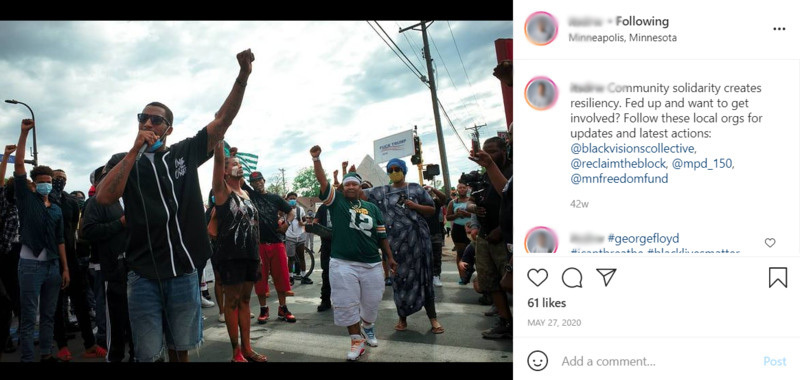 2020-05-27
2020-05-27Community Solidarity Creates Resiliency
Community solidarity creates resiliency. Fed up and want to get involved? Follow these local orgs for updates and latest actions: @blackvisionscollective, @reclaimtheblock, @mpd_150, @mnfreedomfund -
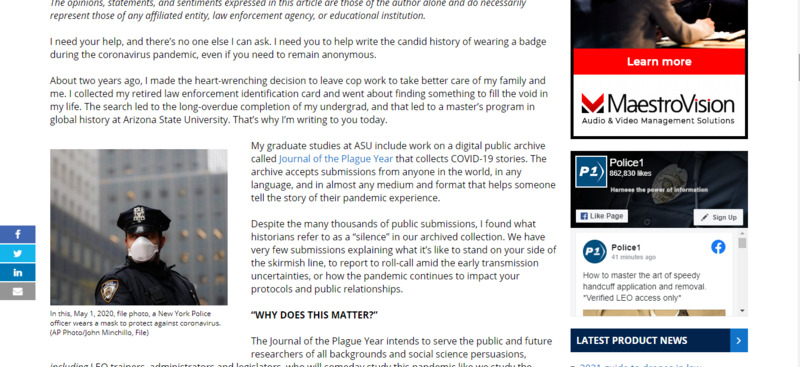 2021-03-09
2021-03-09Police1 Promotes Law Enforcement Submissions to the JOTPY COVID-19 Archive
I wrote this article for Police1 to promote law enforcement submissions to the JOTPY COVID-19 archive. At the time of this publication, Police1 enjoys approximately three million unique visits per month to its website. The site published my article on 03/09/2021, and I intend to use this article to encourage further promotion of the archive's Law Enforcement collection. -
2019-03-20
The disregarded
My experience was disheartening and eye opening. My department and municipality seemingly showed their true colors toward specifically road patrol. We were to continue to show up and perform our duties. When Covid-19 got a little more serious we told we could relax traffic enforcement and stay out of business unless called there. That was appreciated. And that was all we got. About a month road patrol was told we were being forced to take a day off to help limit our chance of exposure by a whopping %16. Sounded good, then we were told our forced day off we were to be “on call”. Then we were told that as road patrol since we were only supposed to be fit for duty/on call for 8 hours, we would not be getting our CONTRACTUALLY OBLIGATED and EARNED 4 hours of compensatory time! That was a big morale boost, sarcasm heavily implied. The. We as road patrol we found out every other department in the city was “working from home” including inside positions at our own department, ie detectives , court officers and administration. Those inside positions would receive full pay and not lose any financial compensation unlike road patrol. All the while other area department were being compensated extra for working during a pandemic. Some department got extra pay some got extra vacation time or comp time. We got nothing and were threatened in actually losing compensation. But we were expected to perform our duties still. We did receive a bonus of $1,000 from the federal government that was taxed. So we got $800. I am not complaining about an extra $800 mins you. But that money came from the federal government Not my municipality who has yet to recognize our efforts to this day. Needless to say morale is in the gutter and with an upcoming contract negotiation it is not going to get better. I feel the municipality could have done more or at the least something to recognize what we did. Granted it was unprecedented for all, but dealing with unprecedented from the road and the comfort of your home on Zoom are two polar opposites. -
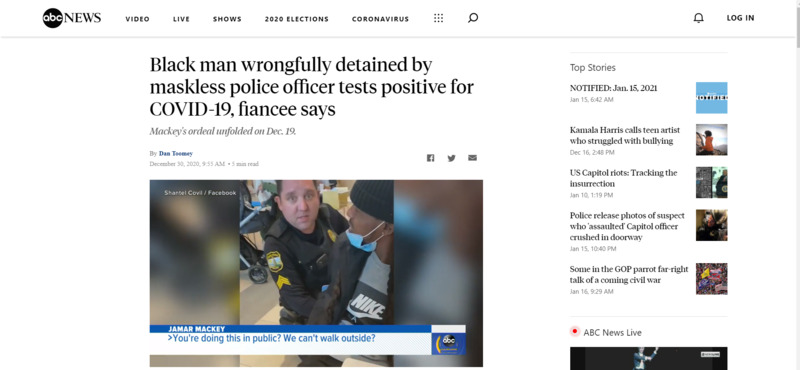 2020-12-30
2020-12-30Black man wrongfully detained by maskless police officer tests positive for COVID-19, fiancee says
Excerpt from article: A Black man who was detained by police in Virginia Beach, Virginia after being suspected for a crime he did not commit, has tested positive for the coronavirus, according to his fiancée, Shantel Covil. -
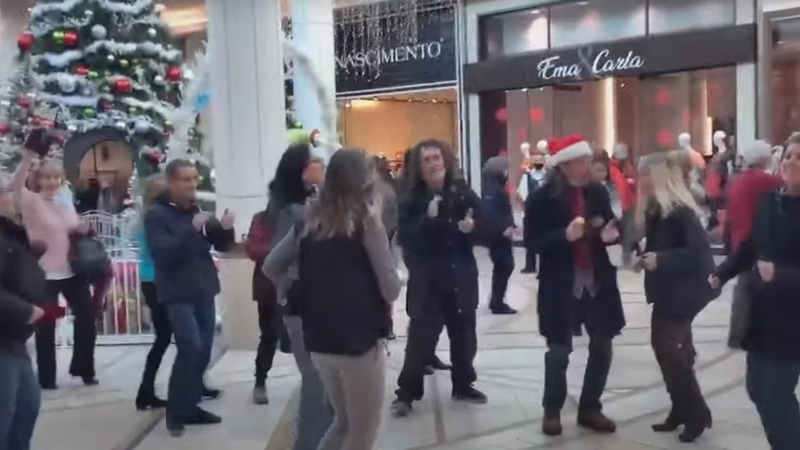 2020-11-22
2020-11-22Social anti-mask: Police break up anti-mask dance gathering at Quebec shopping mall, issue fines
One video portrays a dance gathering at a Quebec shopping mall. -
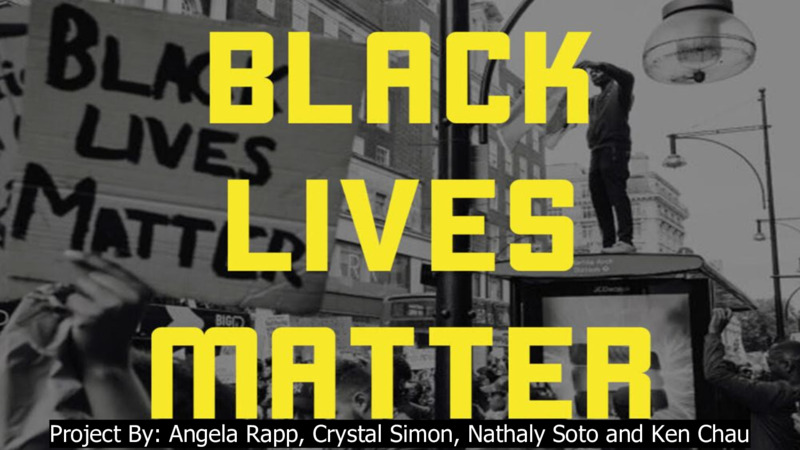 2020-05
2020-05Police Brutality and BLM
This presentation provides the history of police brutality towards POC, what led to the protests and the changes that being implemented -
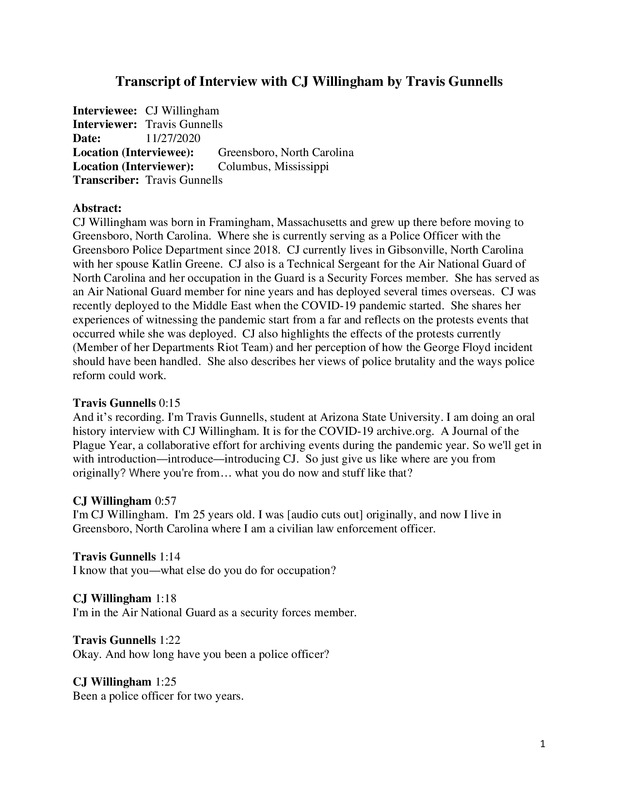 11/27/2020
11/27/2020CJ Willingham Oral History, 2020/11/27.
The Oral History interview is with CJ Willingham and she describes her experiences and views during the pandemic year. CJ gives her encounters during the initial pandemic and how the pandemic is affecting her now. She explains her perspective on more than the pandemic. CJ shares her knowledge on protests, police brutality and police reform. -
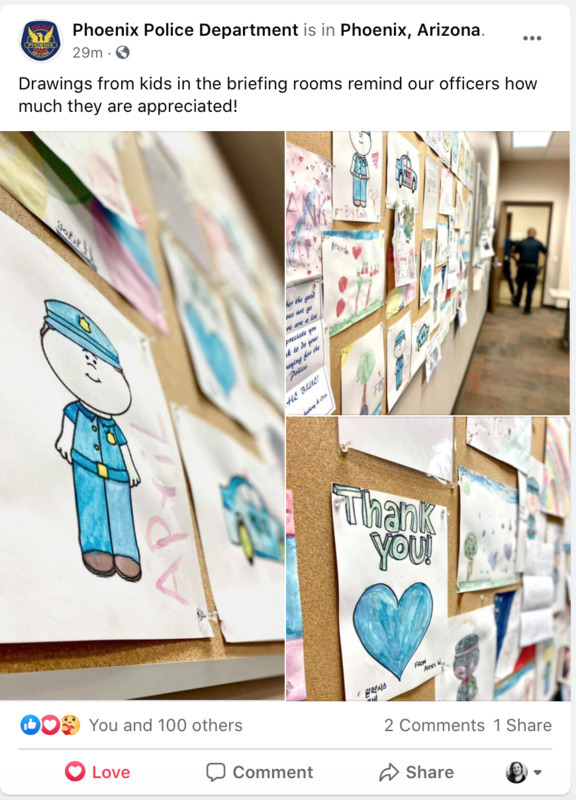 2020-11-22
2020-11-22Ashley Pierce's JOTPY Portfolio
Over the past 14 weeks, I have had the opportunity to work on The Journal of the Plague Year digital archive with Arizona State University. I learned a vast amount over the course of the internship, such as how to write press releases, collection plans, blog posts and other forms of advertising for the archive. I also learned about the ins and outs of archiving and the behind-the-scenes considerations that are involved in building and maintaining an archive. This was my very first graduate school class and as such, I wasn’t sure that starting with an internship was the best idea, but after the first week or two I realized that this was the perfect way to start, since it was basically getting a preview of the type of work someone in the public history field would be doing and I got very excited, determined that this was the type of career I wanted to pursue. The writing for publication skills that I have started to develop, I think will be extremely valuable as those skills are not just applicable to public history, but any career field really. The oral history project also provided the opportunity to work on my interviewing skills. Oral histories are vital to the study of history and even though this is an area I still need to work on, at least now I have the basic foundation to build on. For my collection within the archive, I chose to focus on Law Enforcement, as that is a community that is near and dear to my heart. I currently work in law enforcement and I have family that does as well. When we discussed silences in our weekly readings, we talked about how to identify silences and how to work towards filling them. I noted that there were very few if any, submissions to the archive from the perspective of law enforcement so I wanted to work towards filling that silence. Overall, this internship was a great experience and entry into both the public history field and graduate studies. I know that the skills I have developed here will serve me well as I continue my graduate studies! -
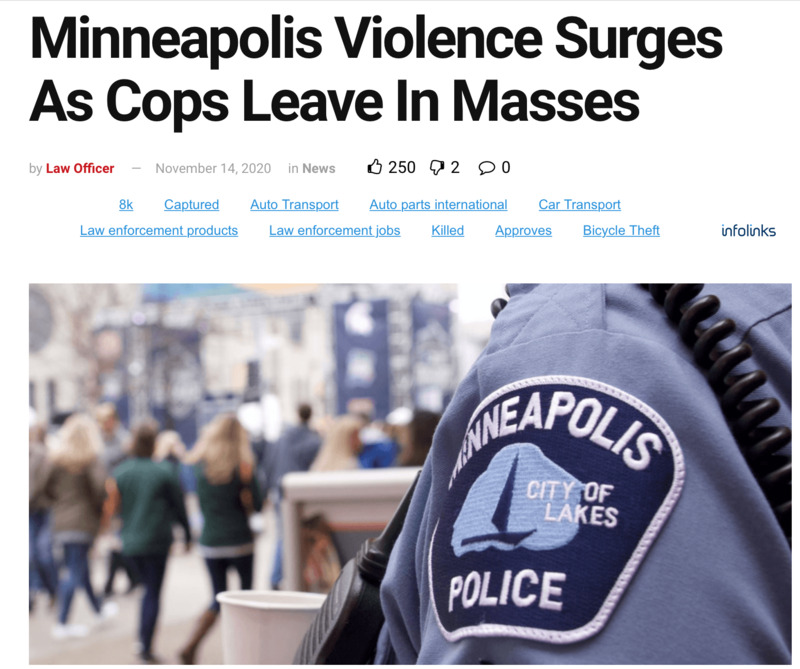 2020-11-14
2020-11-14Who you gonna call...?
After the city council expressed a desire to defund and possibly disband the police altogether, a vast number of officers decided to leave the department on their own, frustrated with the lack of support. Now, Minneapolis is scrambling to find additional officers from other agencies to deal with the rapidly escalating crime surge in their city. -
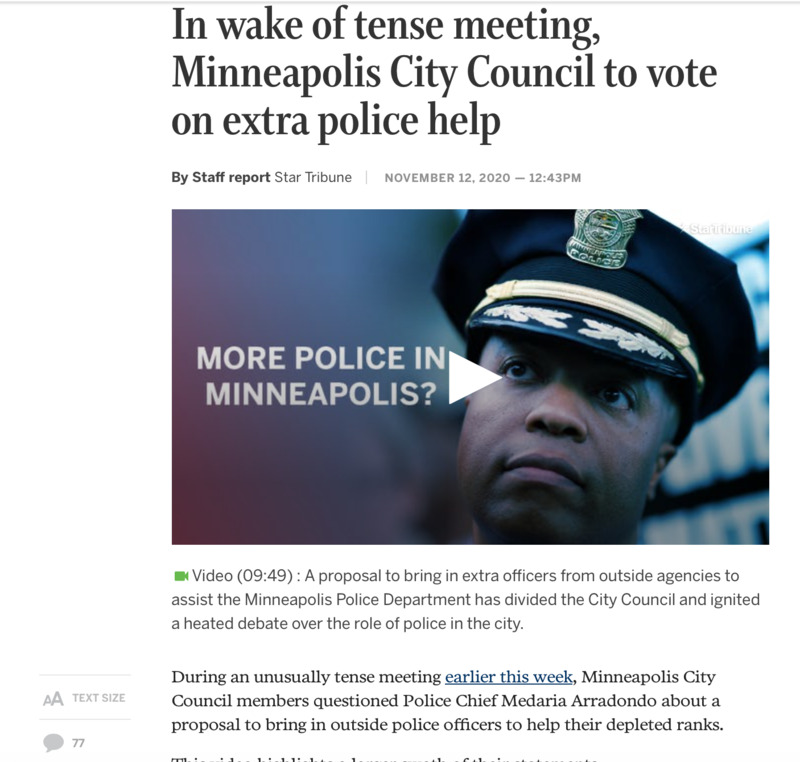 2020-11-12
2020-11-12First you don't want help... Then you NEED help...
Earlier in the year, Minneapolis was one of the first locations to start crying, "Defund the Police..." Now after a long year of protests and riots and all other types of struggles, the city realizes that those they had previously seen as the enemy, the source of the problem were actually the ones holding back the tide and now they see how much the police are really needed. -
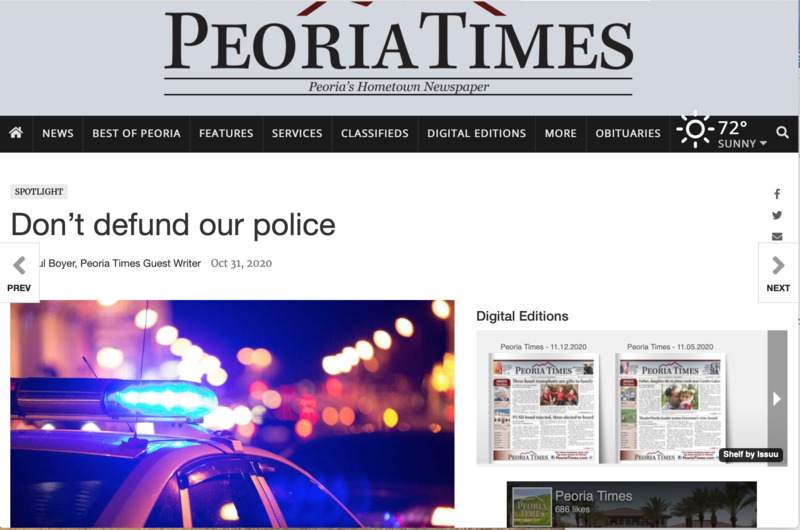 2020-11-12
2020-11-12Don't Defund the Police
In this article, author Paul Boyer discusses the lack of logic behind the Defund the Police movement and asks who really would benefit from a decreased police presence. The article makes some sound points and raises important questions that many might not have even considered. -
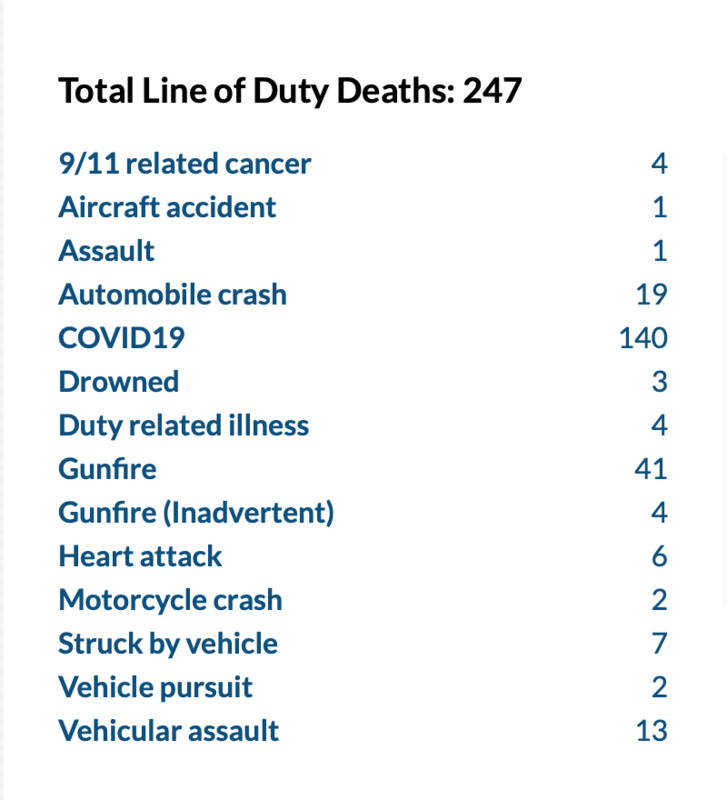 2020-11-12
2020-11-12COVID-19 Law Enforcement Deaths
Throughout the year, Law Enforcement has been under the microscope, more so than every before. With all the negative attention being heaped on officers, police, troopers, and deputies, it can be hard to remember that they too are being affected by this pandemic and that no one is safe or immune. The current statistics (as of Nov 2020) show that the #1 killer of law enforcement officers is COVID-19. Hopefully, the new year will bring smaller numbers and a brighter outlook for Law Enforcement. -
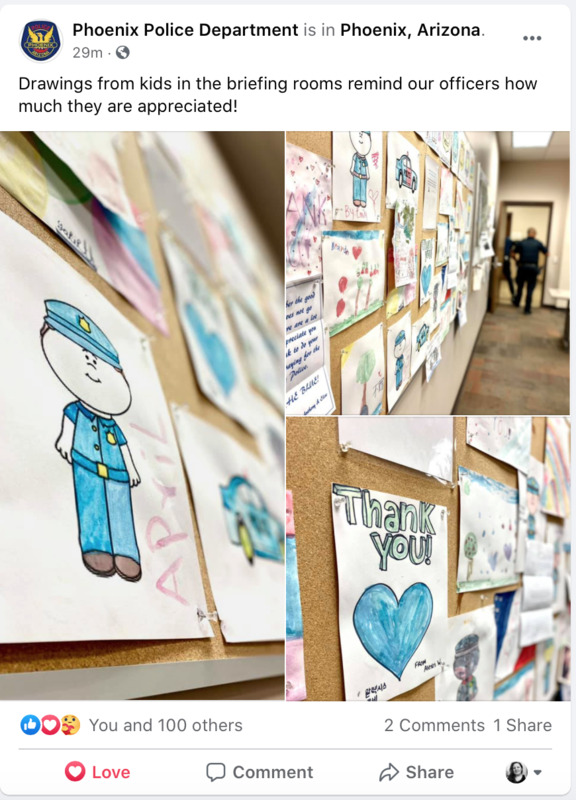 2020-11-08
2020-11-08Thank you Phoenix PD!
These cards were sent to the Phoenix Police Department by children to thank them for keeping their community safe. Its nice to see that there is still a lot of support for officers. Law Enforcement is a hard job and sometimes it can be hard to remember that people still care about and support those who protect and serve. -
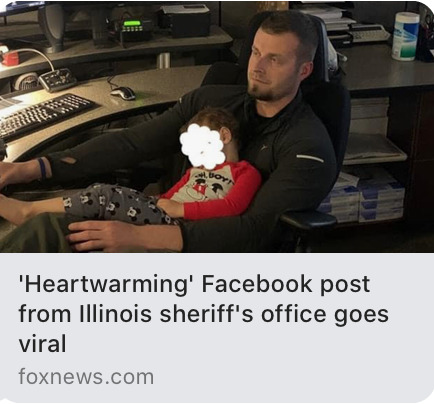 2020
2020Heartwarming
This is a small article I came across while browsing on Facebook. All to common these days are depressing, sad, aggravating messages and stories, so coming across a positive story was particularly exciting. Thank you to all those officers who provided help and comfort to that little boy! -
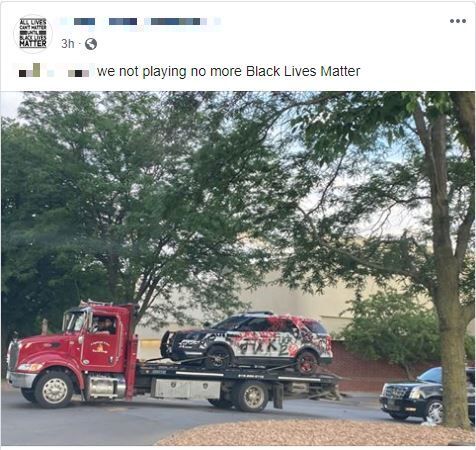 2020-11-06
2020-11-06Cop Car Vandalized
After the protests turned violent cooled down in Des Moines, Iowa, there was still a lot of anger. One group decided to vandalize this cop car to send a message to the public/media. This is a picture from a social media post of the cop car. -
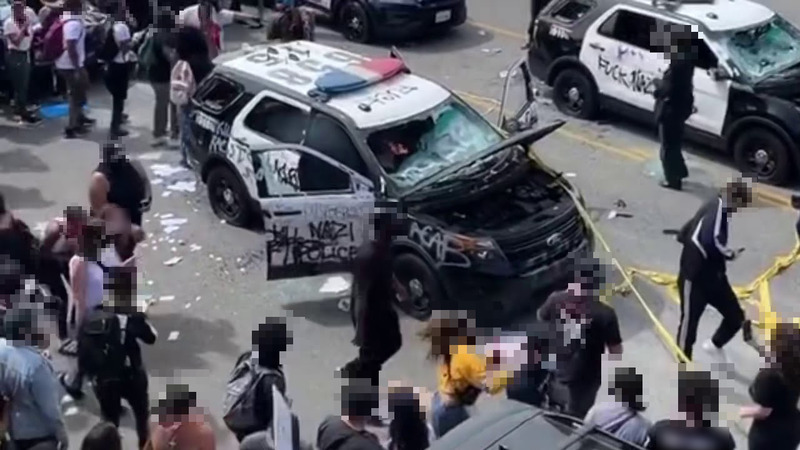 2020-06-04
2020-06-04Destroyed Cop Cars
This is an image of protesters destroying abandoned police cars in a Black Lives Matter protest-turned riot in 2020. -
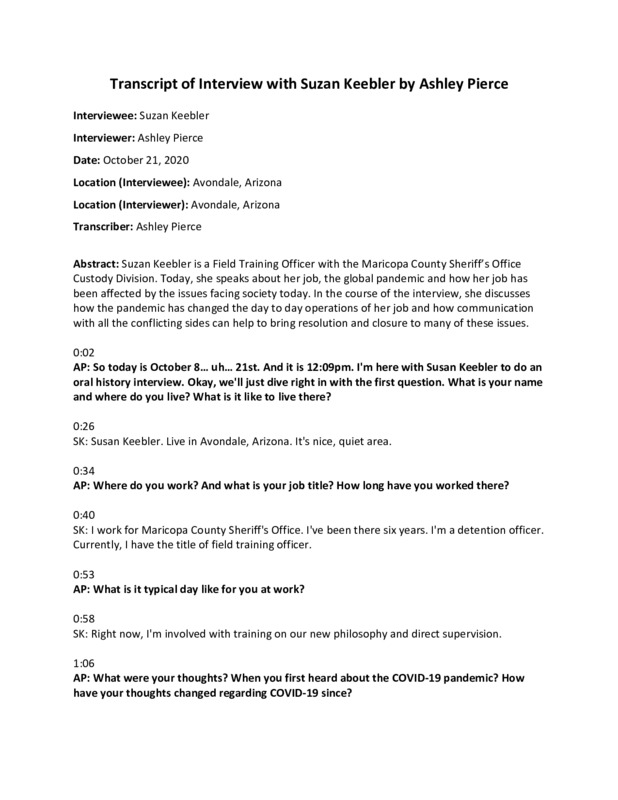 10/21/2020
10/21/2020Suzan Keebler Oral History, 2020/10/21
Suzan Keebler is a Field Training Officer with the Maricopa County Sheriff’s Office Custody Division. Today, she speaks about her job, the global pandemic and how her job has been affected by the issues facing society today. In the course of the interview, she discusses how the pandemic has changed the day to day operations of her job and how communication with all the conflicting sides can help to bring resolution and closure to many of these issues. -
2020-10-30
The Defunding Police Idea
I wanted to talk about the part of the BLM movement where people mention defunding the police. I found an article that talks about what the idea is. -
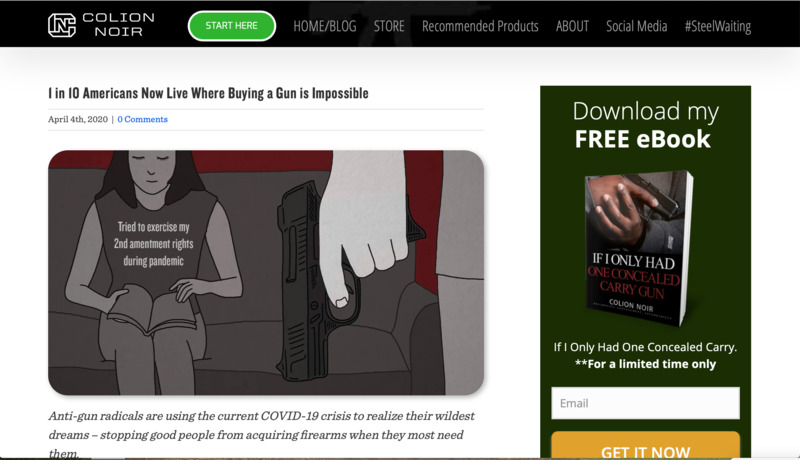 2020-04-04
2020-04-04Using the pandemic to prohibit gun sales
This particular story pertains to the overreach of government entities during the covid-19 pandemic, specifically regarding gun sales and the second amendment. Various government entities have utilized the pandemic to prohibit or impede gun and ammunition sales. This is particularly important to me as I believe it is the right of every law abiding man and woman to possess firearms to protect themselves and their families if they choose to do so. Furthermore, I believe in a fair and impartial government which should not have the ability to circumvent standardized governmental procedures in the event of an “emergency” they deem fitting. -
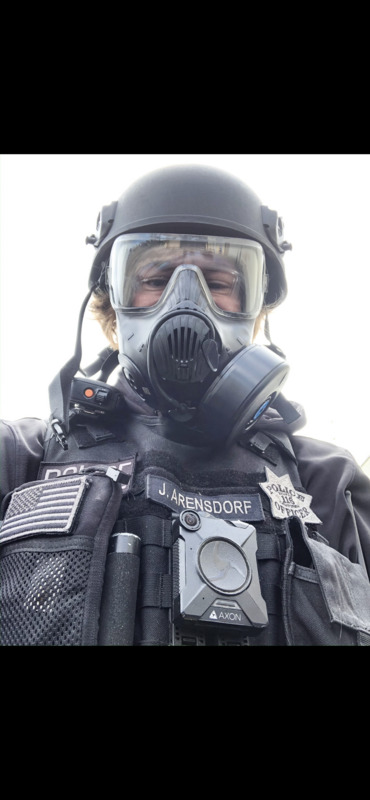 2020-03-21
2020-03-21Policing the Plague
This is a photograph of myself that I took just prior to the service of a search warrant on March 21st 2020 in Salinas, California. The state of California was the first to issue a statewide lock down order due to COVID-19 and had done so just the day before on March 20th. Officers in my department were required to don our gas masks for the service of search warrants and other specific activities at this time due to concerns of contacting the virus. These specific gas masks are issued to be used in environments in which CS or CN gas is introduced. They are also designed to be effective in nuclear fallout and are subsequently extreme overkill in regards to protection against COVID-19 and additionally utterly unpractical for officers whom work 40 plus hours a week. The requirement to wear these masks was very short lived as we soon downgraded to surgical masks and cloth masks. Nonetheless, this exemplifies the fear that has surrounded COVID-19, especially in the early days of the pandemic, and the often drastic reactions we as a society have had in response. -
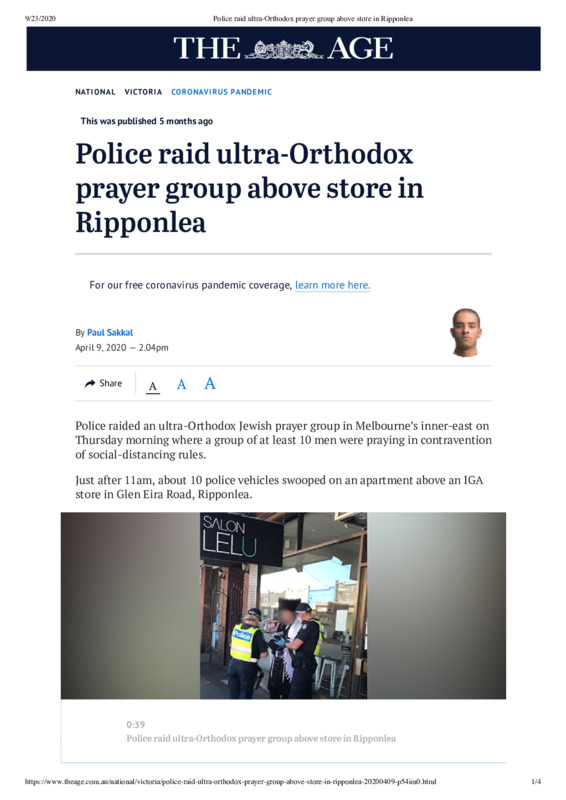 2020-04-09
2020-04-09Jewish Melbourne: 'Police raid ultra-Orthodox prayer group above store in Ripponlea'
report in The Age, by Paul Sakkal: "Police raided an ultra-Orthodox Jewish prayer group in Melbourne’s inner-east on Thursday morning where a group of at least 10 men were praying in contravention of social-distancing rules. Just after 11am, about 10 police vehicles swooped on an apartment above an IGA store in Glen Eira Road, Ripponlea." -
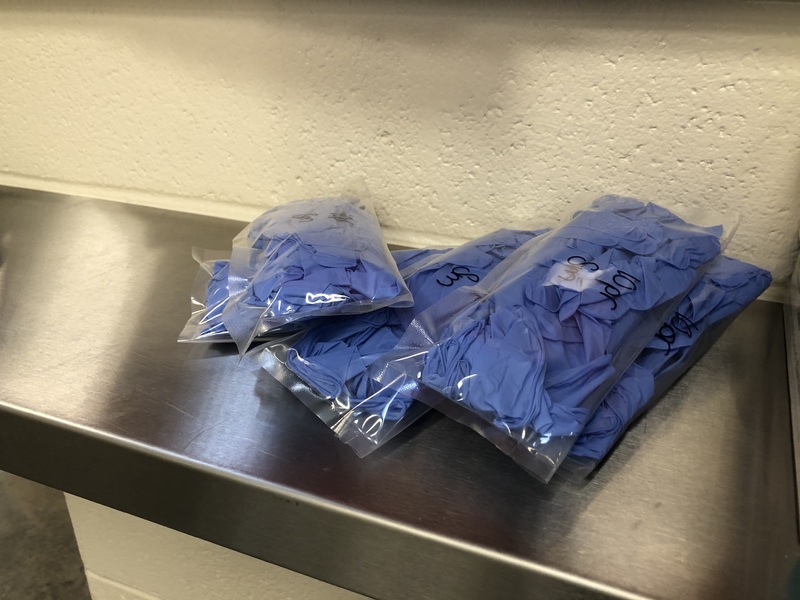 2020-08-18
2020-08-18Work Safety
These photos are some I took while creating PPE Kits for where I work... My workplace has always used them, but now, with the pandemic, we are using a lot more so we made up packets that can be grabbed and taken with we will always have supplies available when we need it. ppe, work safe, COVID-19, HST580, ASU, precaution -
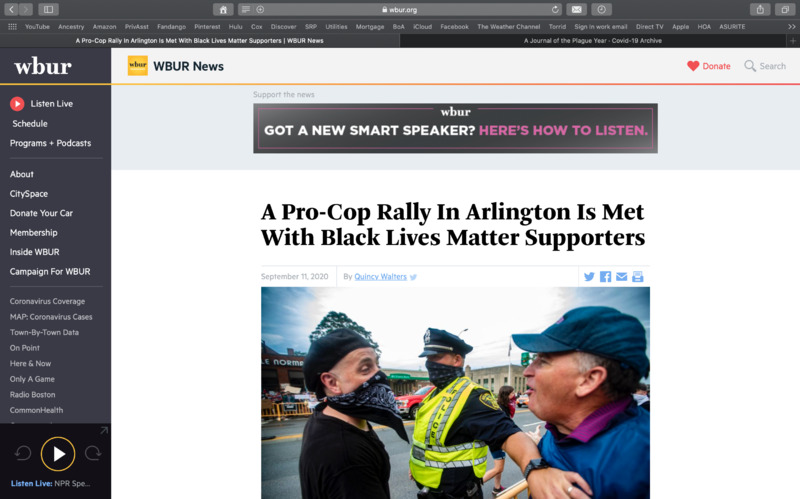 2020-09-11
2020-09-11Some do Support the Blue
With all the negative in the press, it would be easy for one to think that Law Enforcement officers are out there all alone with no support at all. This is simply not true. This article shows that there are those who support LEO's and that officers/deputies/cops are not fighting the good fight all alone. -
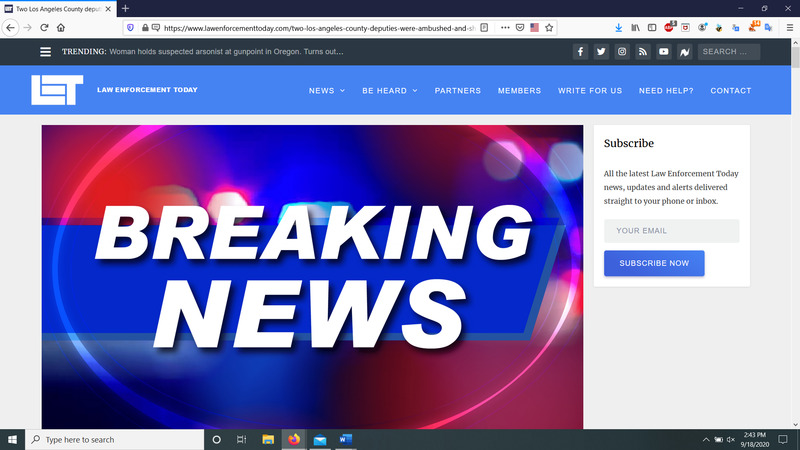 2020-09-13
2020-09-13Sad State of Affairs
I saw this article on facebook and was completely saddened by it. Those two officers were doing nothing to deserve being shot in their vehicles. And then to read that protestors were blocking the entrance to the hospital, possibly preventing ANY emergency traffic from getting in was even more disheartening. I can't even begin to think how to explain this to future generations... So. Much. Useless. Hatred. -
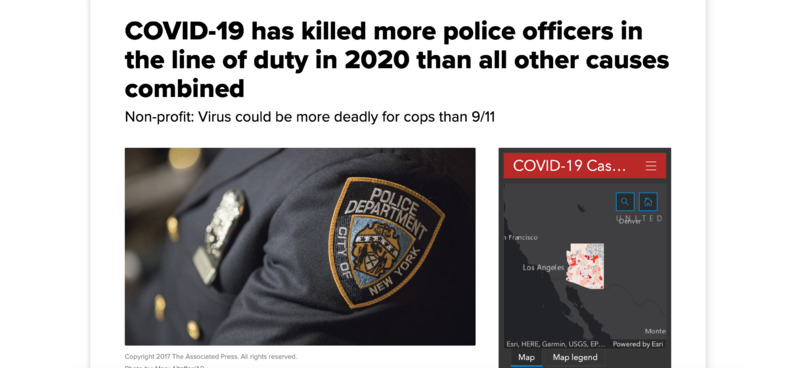 2020-09-03
2020-09-03Covid-19 has killed more police officers in the line of duty in 2020 than all other causes combined
Given the atmosphere of the year 2020 overall, it can be easy to sometimes forget that law enforcement officers are human too and they are facing the same dangers related to Covid-19 as the general public. Everyday, law enforcement officers around the world, put on their uniform for the day and head to work to protect and serve their communities, knowing that this unseen danger lurks around every corner and every call for service they go to. Their voices are often the ones that go unnoticed and unremarked so seeing an article that shines even the faintest light on the struggles they face, this year in particular, is worthy of note. -
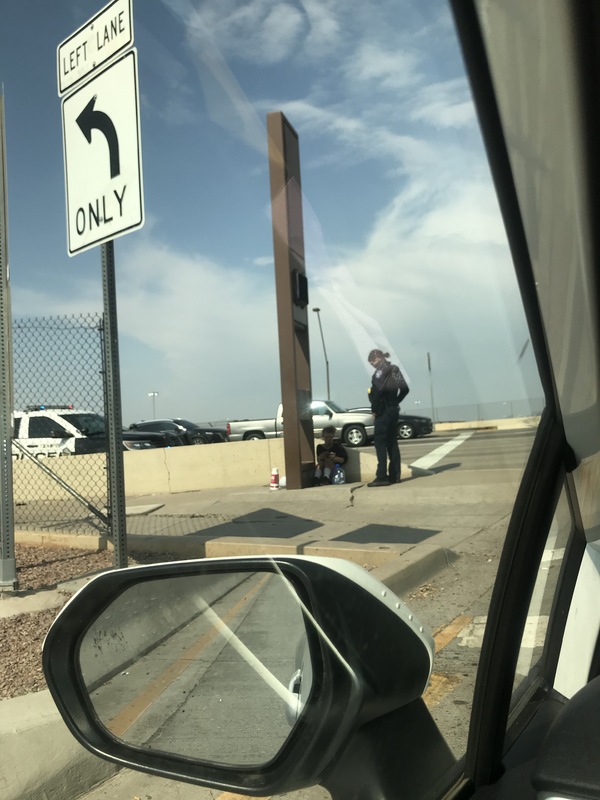 2020-08-29
2020-08-29Homeless in Tempe
As I was driving on Saturday morning, I saw a panhandler at the corner of Priest and the 201 exit. A female cop was talking to her, I was afraid that maybe the cop was telling the woman not to beg or to move, but I saw the woman in the same spot a few hours later. The cop was wearing a face mask. There have been, subjectively, a lot more homeless people on the streets lately. -
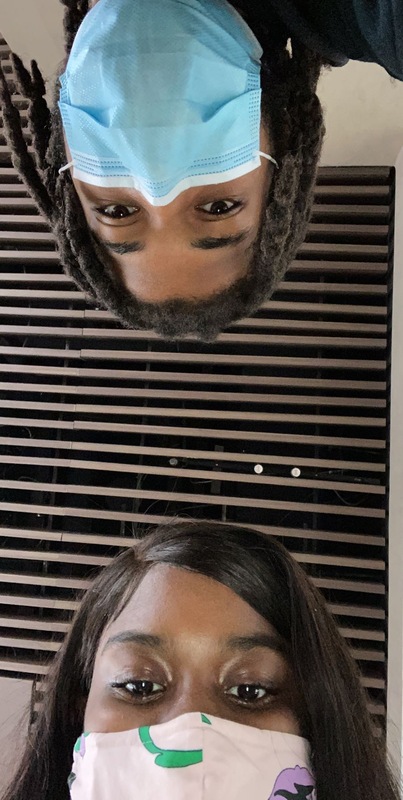 2020-08-16
2020-08-16A Lucky Star Adventure
Victoria Lee-Brewer Professor Dominguez Politics in a Global Pandemic 08/15/2020 Moakley Visual Memory: New York I went to New York for a day, which not only showed me how serious some states are taking this but how officials in certain states are not enforcing some of the policies causing more problems. From the Boston Lucky Star Train terminal, is where I started my adventure to Manhattan, New York. As we got on board, they checked our temperatures I noticed the mandatory mask wearing sign on our way there inside of the bus but not on the way back. I stayed at the Courtyard Marriot in Midtown Manhattan on 34th street which not only had the best stores but the best sales as well. As I walked down the strip shopping with my boyfriend we notice, how all of the police officers are not wearing a mask while 75% of the civilians had on a mask. Which creates answers to questions like, why is the virus still spreading? Officials are not following the CDC and Health guidelines themselves, which explains why the spread in New York is continuous. I even rode the train to the Bronx and observed how Hospitals are not making sure their Sanitizers are staying full and officers once again were not wearing a protective face mask. Why should the citizens in New York wear a mask if the officers are not going to? Police officers are supposed to set examples and protect the public, instead they seem like a danger to public health. -
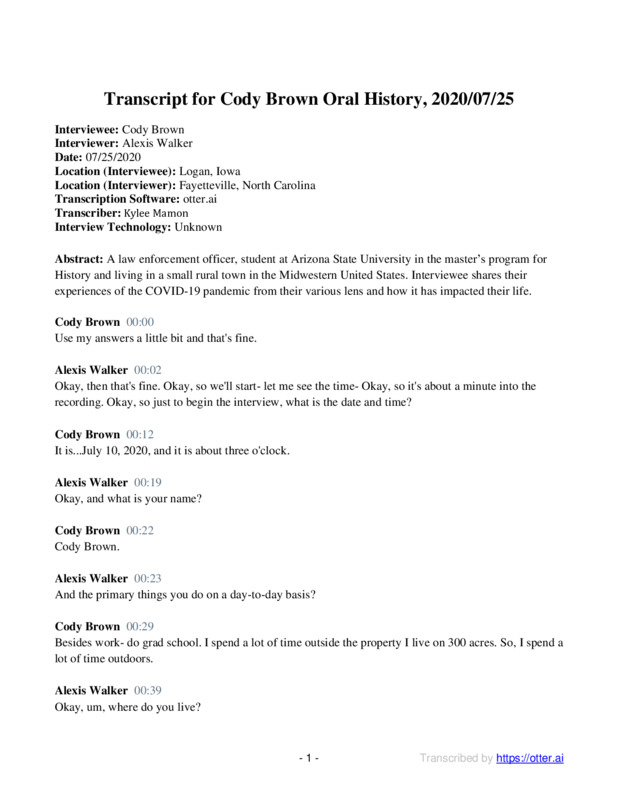 07/25/2020
07/25/2020Cody Brown Oral History, 2020/07/25
This is an oral history interview I conducted with a law enforcement officer and fellow ASU intern. He is in the History Master's program at ASU with me and it gives the perspective of not only a law officer but also one who lives in a very rural area in the United States during the pandemic. -
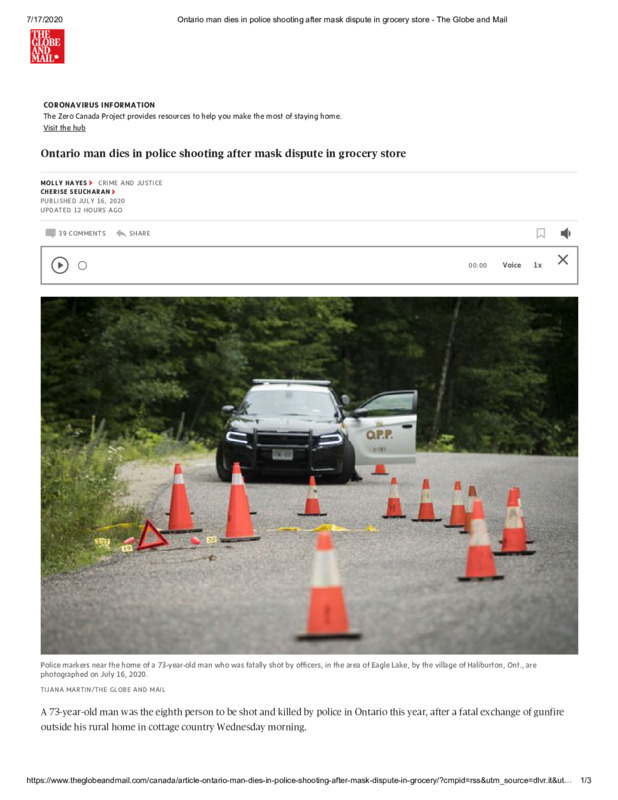 2020-07-16
2020-07-16Masks and Violence: Ontario man dies in police shooting after mask dispute in grocery store
An article relaying an incident which encompasses two of the largest issues facing Canada, and Ontario, specifically at the moment: the coronavirus (and subsequent public health measures) and changing views on the role of police in society. A 78 year old man was shot and killed by police after if he refused to wear a mask in a supermarket in cottage country north of Toronto. He then assaulted an employee and drove off recklessly, prompting police to attend his house to arrest him, where the fatal incident occurred. The body responsible for the investigation of this and other police involved deaths in Ontario, the SIU, has come under scrutiny this year as social justice advocates feel it is inappropriate for a watch dog body to be made up largely of retired police officers is not impartial. -
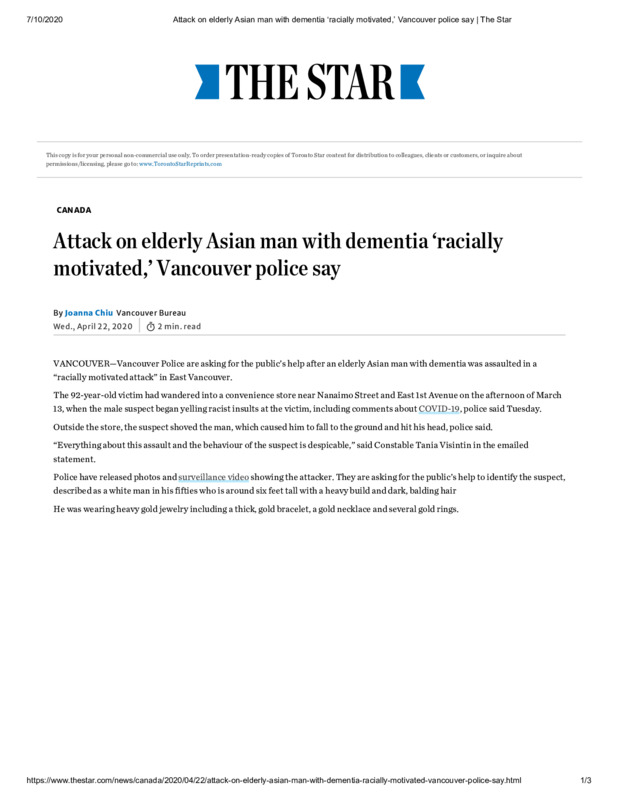 2020-04-22
2020-04-22Attack on elderly Asian man with dementia ‘racially motivated,’ Vancouver police say
"The 92-year-old victim had wandered into a convenience store near Nanaimo Street and East 1st Avenue on the afternoon of March 13, when the male suspect began yelling racist insults at the victim, including comments about COVID-19, police said Tuesday. "Outside the store, the suspect shoved the man, which caused him to fall to the ground and hit his head, police said." -
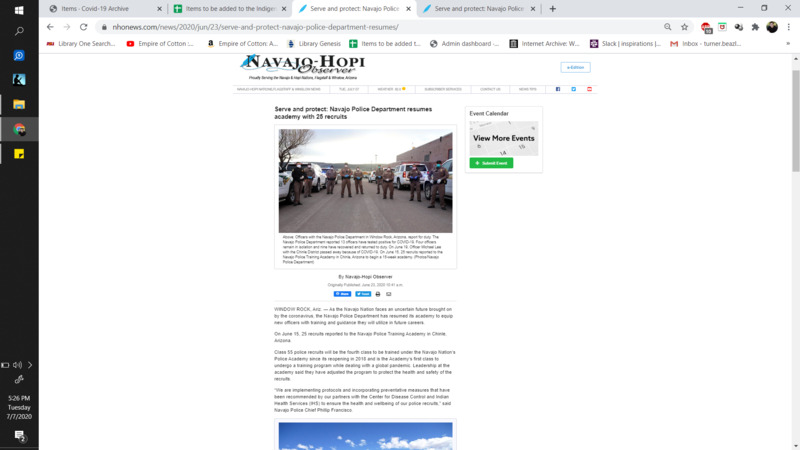 2020-06-23
2020-06-23Serve and protect: Navajo Police Department resumes academy with 25 recruits
"Officers with the Navajo Police Department in Window Rock, Arizona, report for duty. The Navajo Police Department reported 13 officers have tested positive for COVID-19. Four officers remain in isolation and nine have recovered and returned to duty. On June 19, Officer Michael Lee with the Chinle District passed away because of COVID-19. On June 15, 25 recruits reported to the Navajo Police Training Academy in Chinle, Arizona to begin a 15-week academy. (Photos/Navajo Police Department)" -
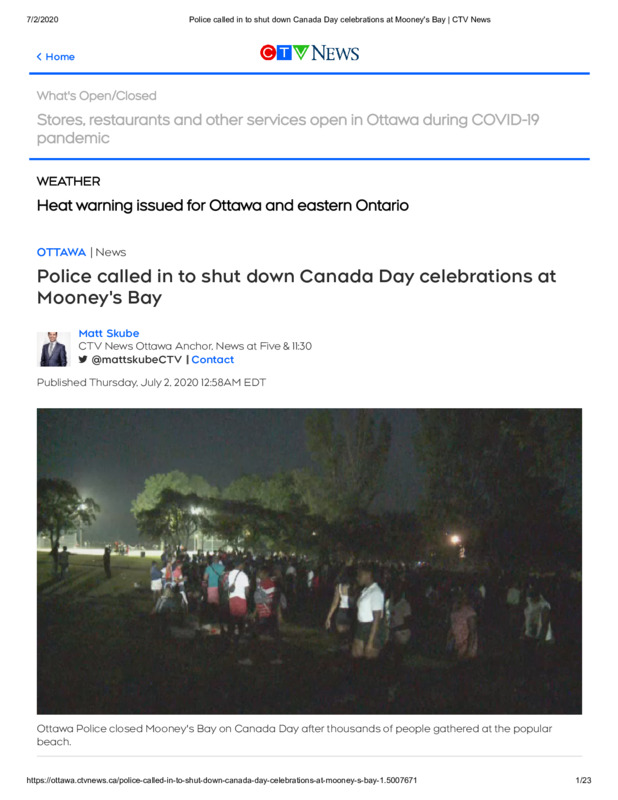 2020-07-01
2020-07-01Police called in to shut down Canada Day celebrations at Mooney's Bay
"Hundreds of people were on the beach and the surrounding area Wednesday afternoon and evening. One officer on scene told CTV News that at one point, there were close to 3,500 people in the area. "Witnesses say there was very little physical distancing." "Just after 8:00 p.m., police were called to the Mooney's Bay area, where they started turning cars and residents away. Around 10:00 p.m., the City requested the site be closed immediately, citing health concerns and disorder issues." -
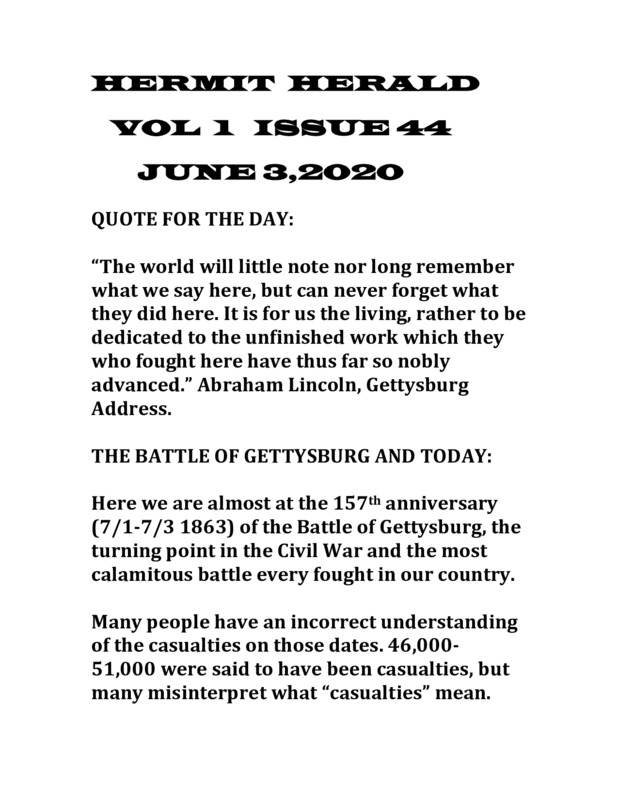 2020-06-30
2020-06-30HERMIT HERALD VOL 1 ISSUE 44
MEMORIALS AND RACE -
2020-06-11
Don't stereotype. Ever.
COVID-19, BLM Notes June 11, 2020 It's hard to put my thoughts in words. The news and social media are swirling in a constant maelstrom of things that seem like they should be false. Yet they're not. In the middle of the BLM and COVID-19 crisis, President Trump announced that he would be holding his first rally since Covid-19 in Tulsa Oklahoma. It will be on the anniversary of the massacre of the black community in Tulsa by the KKK. It also is a holiday marking the end of slavery in the US. This can go so wrong. 1968 Democratic Convention wrong. With semi-automatic weapons wrong. I'm sure supporters can make the argument that Trump is planning to make a speech that will help heal wounds. I hope that is the case. I sincerely doubt it. Even if it is, his administration has to understand the tinderbox they are laying fuel for. I simply don't understand. Additionally, COVID-19 cases are on the rise as states begin to reopen. So many people gathering for rallies and protests will up the ante even more. 😔😔 I'm angry about seeing my former law enforcement community painted with the same hostile brush that should be pointed at the bad cops and unions that protect them. It's damn tough to be a cop, even in a small community like mine. I still bear some scars. Cops are underpaid for the shit they have deal with. Mental health services may be offered if a department is large enough, but it would go on ones permanent record. Mental health is still stigmatized, so why would a cop want treatment for depression on their records? When Ron and I were dating, I had to undergo, on separate occasions, a herpes test and two AIDS tests. Imagine the fun that it is to tell my new boyfriend that kissing isn't allowed because I may have gotten herpes after giving mouth to mouth to someone I just cut down. (His response : If you have it, I already have it, so it doesn't matter. You marry a guy like that. I did). Then we had a another suicide. We didn't wear gloves back then. I'm sure we had them in the trunk but it would be wimpy to wear them. I got blood on my hands. Then the coroner found the suicide note. AIDS. I'm a nail biter. I had hang nails down to my knuckles. I went to Springfield for my tests because I didn't dare have it done in my community. AIDS was a very dirty word back then. I'm a chatterbox. The phlebotomist and I would be joking and laughing until they saw what the draw was for. A cold chill over took the room as they loudly triple gloved. Snap, snap, snap...... glaring at me. I was a junkie or a prostitute. Once I explained, they were so kind and emphatic. That's when I decided to try and treat everybody with kindness and respect. I don't know their back story and what led them to be in the position they are in. Be an asshole to me and I can be one right back but you get more peas with honey. Turns out, it wasn't AIDS. False positives were common back in the early days. Strangely enough, these aren't calls that bug me. That's what cop do. There's only one that eats at me and I'll unpack that some other time. I'm still processing the ghosts of that one. I bring them up because this is the kind of emotional crap cops deal with. Every single god damn day we clean up humanities mess. Yet there are people who want to vilify the entire law enforcement community, a community that includes people like me. I remember comforting a two year old toddler at another suicide. Mom thought the sitter would show up before the child woke up. She didn't. I'm holding this little girl who spent the morning putting popsicles on her dead diabetic mother's chest to get her to wake up. 36 years later I remember exactly where I standing, trying to comfort that poor child as I tried to process what was going on. So, as you shout to defund the police and tear down every single police agency that has ever represented you, think of me as a young adult from the age of 22 to 24, holding that child, wondering if I was going to die from AIDS, almost getting herpes from a corpse. I still had almost five years to go. I'm the people you are denigrating. I'm proud of the work I did. If you're looking for the bad, that's all you're going to see. Be cautious in the wording of any negative comments you might leave. I'm not much in the mood to keep my peas on my knife. -
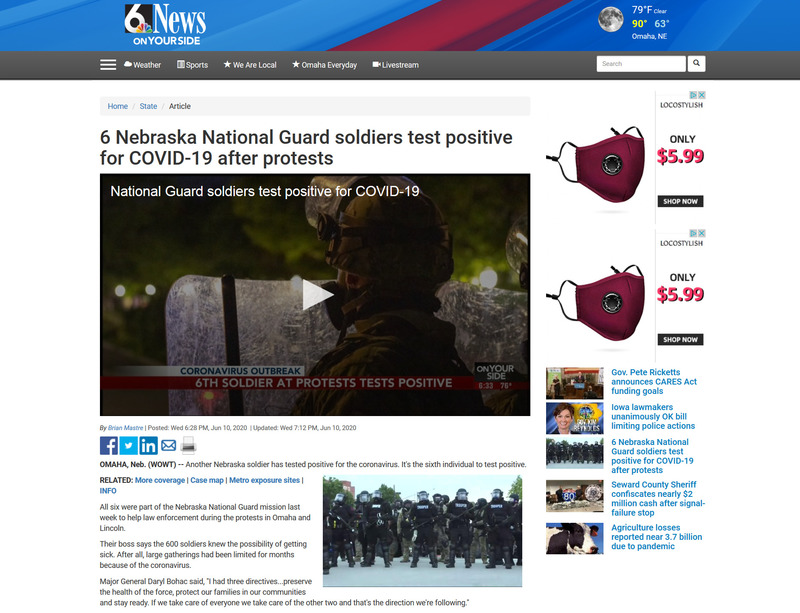 2020-06-10
2020-06-10Nebraska National Guard Soldiers Test Positive for COVID-19 Following Protests
A number of Nebraska National Guard soldiers have tested positive for COVID-19 following missions to assist law enforcement amid protests in Omaha and Lincoln. None of the affected soldiers have been hospitalized and all are isolating in their homes. Protests have flared across the country following the death of George Floyd by a Minneapolis police officer, while in custody. Many of the protests have individuals packed tightly in large groups, many not wearing masks or following other recommended guidelines to slow the spread of the virus. -
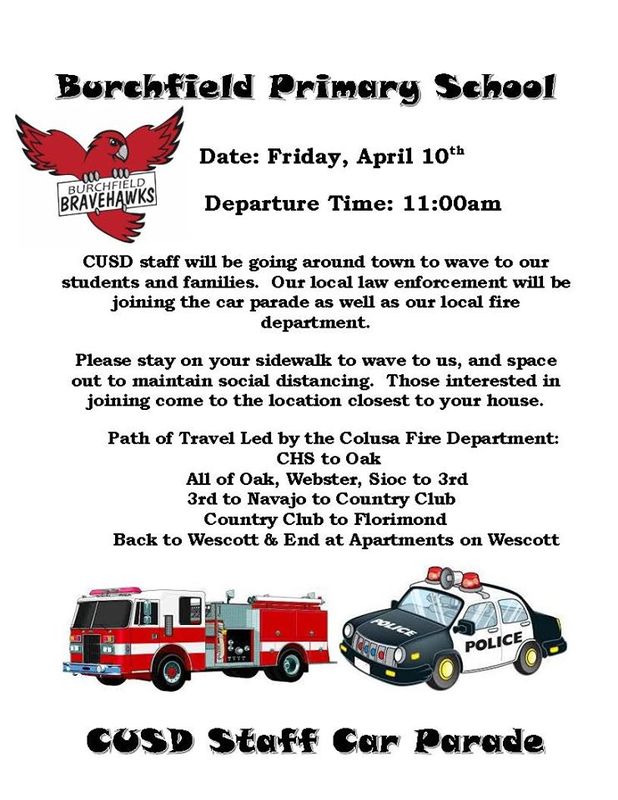 2020-04-10
2020-04-10Burchfield Primary School Staff Car Parade
Flyer advertising a parade of school employees traveling through the city of Colusa, California. The parade was intended to allow separated students and teachers to see one another in person, albeit at a distance. Similar parades of teachers and school staff members occurred in neighborhoods around the United States during the COVID-19 campus closures. -
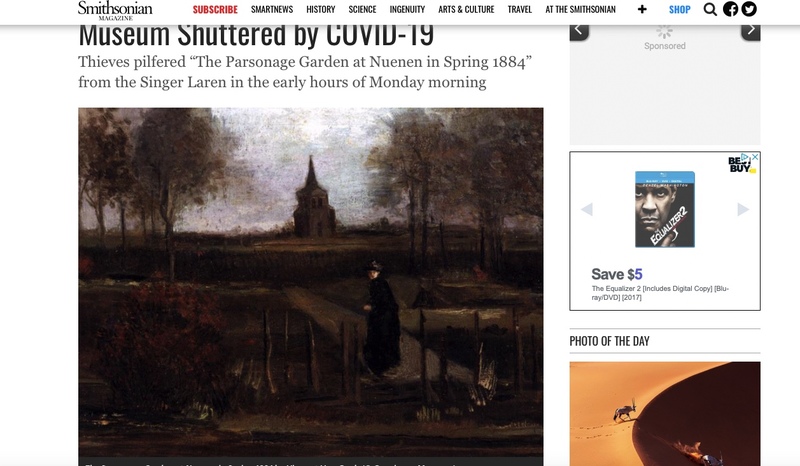 2020-03-30
2020-03-30Van Gogh Painting Stolen
A Van Gogh painting was stolen from a museum in the Netherlands due to closure because of COVID-19. -
 2020-04-29
2020-04-29Living through Covid-19: 04/29/2020
This is a journal entry that specifically focuses on the transition to online learning and the practice of social distancing. *anonymous *This was intentionally a journal/diary entry therefore it was done through a word doc. -
 2020-05-16
2020-05-16Just as You Expected: Police Report a 50% Increase in Robberies Thanks to Everyone Wearing Masks
Wearing Masks Increases Robberies -
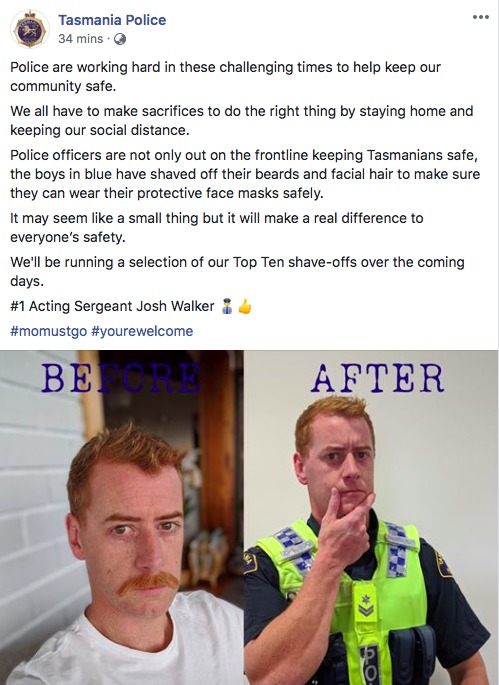 03/31/2020
03/31/2020Tasmania Police Top Ten shave-offs
HUM402 The image is a screenshot of the Tasmania Police Top Ten Shave Offs. This is one in a series of ten images which depict Tasmania Police Officers who have had to shave off their facial hair in order to wear protective personal equipment safely. -
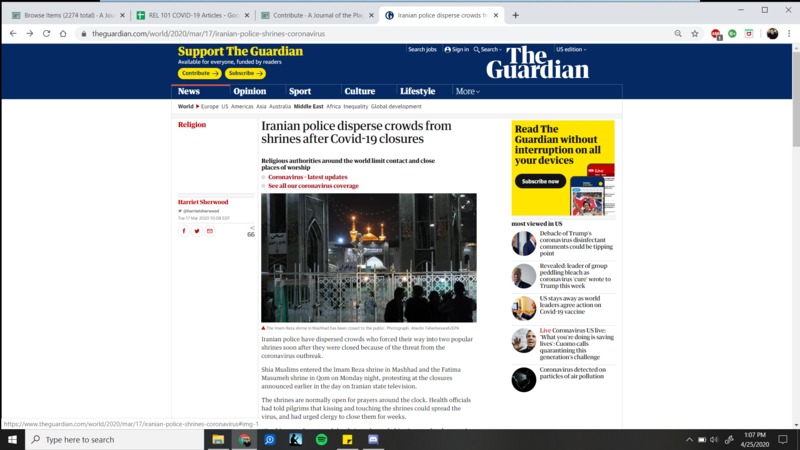 2020-03-17
2020-03-17Iranian police disperse crowds from shrines after Covid-19 closures
The article talks about how Iranian police are forced to break apart crowds of people who're forcing themselves into shrines which are normally used for prayers around the clock. It also states that COVID has affected mainly important festivals. The Article also talks about how Italy has opened private prayers and confessions. Europe and the US churches mosques and synagogues have been suspended for public celebration as well. It also talked about how 2/3rds of the confirmed cases of the virus inMalaysia can be linked back to an Islamic conference attended by about 16,000 people. -
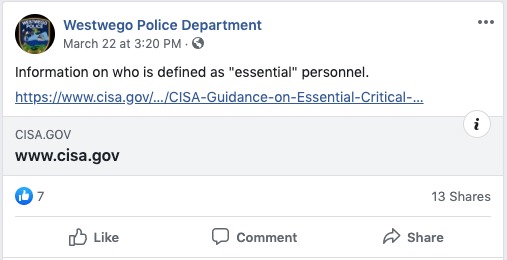 2020-03-22
2020-03-22Police Define Essential Personnel, Westwego, LA
Westwego Police Department shares the definition of essential personnel via social media. -
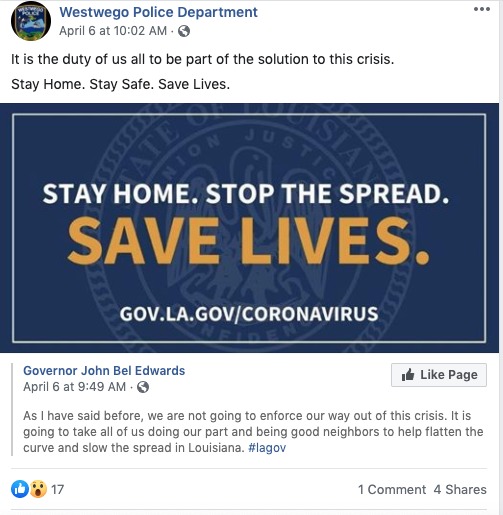 04/06/2020
04/06/2020Police Ask Public to Stay Home, Westwego, LA
Westwego Police Department is asking people to be the solution and stay home. -
 03/24/2020
03/24/2020Crime Scene Investigations During COVID-19
Discusses the effects of following proper protocol of cleanliness with forensic procedures
